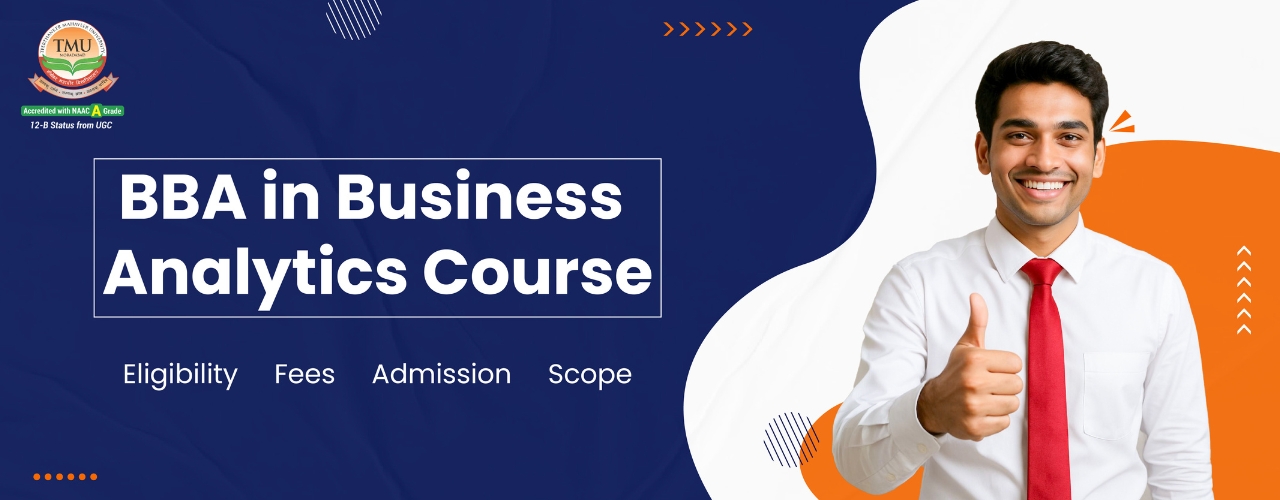BBA in Business Analytics Course: Eligibility, Fees, Admission and Scope
Table of Contents
BBA in Business Analytics is a 3-year undergraduate course that combines business management with data analysis. It teaches students how to use tools like Excel, SQL, Python, and Tableau to analyse data and make smart business decisions.
What is BBA in Business Analytics?
Bachelor of Business Administration (BBA) in Business Analytics is an undergraduate program designed to bridge the gap between business management and data science. This course blends the core fundamentals of business strategy, marketing, finance, and operations with modern analytical tools like data mining, predictive analytics, machine learning, and artificial intelligence.
Think of it this way—while a traditional BBA teaches you how a business operates, a BBA in Business Analytics teaches you how to make a business smarter. It’s perfect for students who are good with numbers, love solving problems, and are curious about how companies make data-driven decisions. This course is a stepping stone into one of the most lucrative and in-demand fields in the global job market today.
Throughout the program, students are trained in using data analytics tools such as Python, R, Excel, SQL, and Tableau. The curriculum also focuses on case studies and real-world business applications, making graduates highly job-ready by the time they complete their degree.
Unlike short-term analytics certifications, a BBA in Business Analytics offers a structured undergraduate foundation in business decision-making backed by analytical thinking. Graduates develop the ability to interpret complex datasets, identify business trends, and support strategic decisions across functions such as marketing, finance, operations, and human resources. This makes the programme suitable not only for data-focused roles but also for future managers and entrepreneurs operating in data-driven organisations.
Teerthanker Mahaveer University
Apply for Admission
Click Here To Apply for Admission
Why Choose BBA in Business Analytics?
If you’ve been hearing buzzwords like "big data," "data science," or "AI-driven insights," you’re already touching the surface of what this course is all about. The modern business world is evolving rapidly, and companies across industries are turning to data to make faster, more accurate decisions. That’s exactly where business analysts step in.
Here are some compelling reasons why choosing this course could be the best decision you’ll ever make:
- High Demand: Business analysts and data-driven professionals are among the most sought-after roles globally.
- Lucrative Salary Packages: Entry-level salaries are higher than most conventional BBA streams, and experienced professionals command six-figure incomes.
- Versatile Career Paths: From finance and marketing to logistics and consulting—every domain needs analytics experts.
- Global Opportunities: Business analytics is a skill with international appeal. Whether it’s Silicon Valley or Singapore, your skills are always relevant.
- Entrepreneurship Friendly: Thinking of launching a startup? This course arms you with data skills to analyse markets, competitors, and performance like a pro.
By choosing a BBA in Business Analytics, you're not just picking a degree—you’re selecting a future-ready career path.
Industry Demand and Market Relevance
Businesses across sectors such as banking, e-commerce, healthcare, logistics, consulting, and technology are increasingly relying on analytics to improve efficiency, customer engagement, and profitability. According to industry hiring trends, entry-level business analytics roles are among the fastest-growing positions due to the rise of digital transformation, AI adoption, and data-led strategy planning.
A BBA in Business Analytics provides early exposure to these high-demand skills, allowing graduates to enter analytics roles immediately after graduation or pursue advanced degrees with a strong technical and managerial base.
BBA in Business Analytics Program Overview
Here's a quick snapshot of what to expect in the program:
| Parameter | Details |
| Course Name | Bachelor of Business Administration in Business Analytics |
| Duration | 3 years (6 semesters) |
| Eligibility | 10+2 with minimum 50% marks in any stream |
| Admission Process | Merit-based or Entrance Test (depending on university) |
| Core Subjects | Data Analytics, Business Intelligence, Statistics, Marketing, Finance |
| Elective Subjects | Predictive Modelling, Machine Learning, Supply Chain Analytics, HR Analytics |
| Tools Taught | Excel, SQL, Python, R, Tableau, Power BI |
| Internships | 6 to 8 weeks (usually between 2nd and 3rd year) |
| Capstone Project | Final semester includes a live business analytics project |
| Job Roles After Graduation | Business Analyst, Data Analyst, Marketing Analyst, Consultant |
| Average Starting Salary | ₹4 – ₹7 LPA (India) / $45,000 – $70,000 (Abroad) |
Programme Learning Outcomes – BBA in Business Analytics
By the end of the BBA in Business Analytics programme, students will be able to:
- Analyse structured and unstructured business data
- Apply statistical and predictive models to real-world business problems
- Use analytical tools to support managerial and strategic decision-making
- Communicate actionable insights through dashboards, reports, and visualisations
- Work effectively in cross-functional and data-driven business teams
Semester-Wise Curriculum – BBA in Business Analytics
| Semester | Key Subjects |
|---|---|
| Semester 1 | Business Communication, Principles of Management, Business Statistics, Excel for Analytics |
| Semester 2 | Microeconomics, Financial Accounting, Database Management (SQL), Business Mathematics |
| Semester 3 | Python for Business Analytics, Marketing Analytics, Data Visualization |
| Semester 4 | Financial Analytics, Predictive Analytics, Operations Analytics |
| Semester 5 | HR Analytics, Supply Chain Analytics, Electives |
| Semester 6 | Internship, Capstone Project, Strategic Analytics |
Duration and Format
| Mode | Suitable For |
|---|---|
| Full-time | Students seeking campus exposure, structured learning, placements, and strong peer interaction |
| Online | Learners preferring flexibility, self-paced study, or parallel skill development alongside work or certifications |
| Hybrid | Students balancing internships, professional certifications, or part-time work with academic learning |
Each format comes with its own pros and cons, but full-time on-campus programs offer better networking opportunities and placement support.
Specialisations Within the Course
As the field of business analytics is vast, many universities allow students to choose electives or minor specialisations based on their interests. Some popular specialisation areas include:
- Marketing Analytics – Focus on customer behaviour, digital marketing metrics, and campaign performance.
- Financial Analytics – Learn how to forecast trends, manage risks, and optimise investments using data.
- HR Analytics – Improve recruitment, retention, and workforce productivity through data-driven decisions.
- Supply Chain Analytics – Learn how to optimise logistics, inventory, and delivery systems with predictive tools.
These specialisations are often chosen in the final year and can significantly boost your employability in niche sectors.
BBA in Business Analytics Eligibility Criteria
Academic Qualifications
To get into a BBA in Business Analytics program, your academic background is crucial. Most universities require applicants to have completed 10+2 or equivalent from a recognised board, regardless of the stream—Science, Commerce, or Arts. However, a strong background in mathematics or economics can be an added advantage.
Students who’ve taken subjects like Mathematics, Statistics, Computer Science, or Economics in high school often find it easier to grasp analytical concepts taught in the course. That said, many institutions provide foundational training in statistics and computer applications during the first semester to bring all students up to speed. Students without Mathematics in Class 12 are also eligible; foundational quantitative and statistics modules are included in the first year to ensure academic continuity.
Some top-tier universities may also conduct interviews or ask for Statement of Purpose (SOP) essays to evaluate a candidate’s motivation and analytical aptitude.
Minimum Marks and Subjects
Different colleges have different criteria for minimum qualifying marks. Here's a general guideline:
- General Category: Minimum 50–60% in 10+2.
- Reserved Categories (SC/ST/OBC): Relaxation of 5–10% in aggregate marks.
- English Proficiency: English as a subject is often mandatory in the qualifying examination.
While most colleges don’t mandate specific subjects, having Math or Computer Science can improve your chances in competitive institutions.
Some private universities conduct aptitude tests focused on logical reasoning, verbal ability, and quantitative aptitude as part of the selection process.
Age Limit and Additional Requirements
While most institutions don’t enforce a strict age limit, some specify that the candidate must not be over 22 years of age at the time of admission. Other additional requirements might include:
- A valid score in an entrance test (if applicable)
- Personal Interview or Group Discussion rounds
- Submission of original documents for verification
International students may need to clear English proficiency tests like IELTS/TOEFL, depending on the university's policy.
Admission Process
Entrance Exams Accepted
While many universities offer direct admissions based on 10+2 marks, some prestigious institutes conduct entrance exams. These exams test a candidate’s reasoning, analytical, and verbal skills. Some of the commonly accepted entrance exams include:
- CUET (Common University Entrance Test)
- NPAT (Narsee Monjee Institute of Management Studies)
- IPMAT (Integrated Program in Management Aptitude Test)
- UGAT (Under Graduate Aptitude Test)
- SET (Symbiosis Entrance Test)
Here’s a brief comparison table of popular exams:
| Exam Name | Conducting Body | Subjects Covered | Mode |
| CUET | National Testing Agency (NTA) | Language, General Test, Domain-Specific | Online |
| NPAT | NMIMS University | Quant, Reasoning, Verbal | Online |
| IPMAT | IIM Indore/IIM Rohtak | Quantitative Aptitude, Verbal Ability | Online |
| UGAT | AIMA | General Knowledge, English, Reasoning | Online/Offline |
Each of these tests usually takes place between April and June every year, and early preparation is key to securing a seat in a top institution.
Direct Admission vs. Merit-Based
Many private colleges and some autonomous universities offer direct admission if the student has secured the minimum required percentage in 10+2. This is especially common in:
- Private universities with self-financed seats
- Management quota admissions
- Online programs
On the other hand, merit-based admissions are strictly dependent on performance in either 10+2 board exams or entrance exams. Top government and central universities often follow this route to ensure fair competition and transparency.
Important Dates and Application Deadlines
Missing deadlines can cost you an entire academic year. Here’s a sample admission timeline:
| Event | Tentative Date |
| Application Opens | January – March |
| Entrance Exams | April – June |
| Results Declaration | June – July |
| Counseling/Interviews | July – August |
| Course Commencement | August – September |
Make sure you visit the official websites of the universities you’re interested in, as dates can vary year to year.
Career Scope After BBA in Business Analytics
Job Roles and Opportunities
Once you complete your BBA in Business Analytics, a world of career opportunities opens up across industries. This degree gives you the edge to work at the intersection of data, technology, and business, which is exactly what modern companies are looking for. Here are some of the most sought-after job roles for graduates:
- Business Analyst – Evaluate business processes, identify needs, and recommend solutions.
- Data Analyst – Analyse datasets to find actionable insights and support decision-making.
- Marketing Analyst – Use data to improve marketing strategies, campaign effectiveness, and customer engagement.
- Financial Analyst – Interpret financial data to help organisations make sound investment decisions.
- Operations Analyst – Improve efficiency across supply chains, production, and logistics.
- Product Analyst – Study product usage trends and guide product development decisions.
- Consultant (Analytics) – Advise businesses on data-driven strategies for growth.
In addition to corporate roles, students can also work in startups, government agencies, or even pursue entrepreneurship using data to identify gaps in the market.
Career Progression After BBA in Business Analytics
Graduates of the BBA in Business Analytics typically begin their careers in entry-level analytical roles and progress into specialised or managerial positions with experience and professional upskilling. A common career trajectory includes roles such as Business Analyst, advancing to Senior Analyst, followed by Analytics Manager, and eventually moving into Strategy or Consulting positions.
With further education, such as an MBA or specialised certifications in data science, business intelligence, or analytics platforms, graduates can transition into leadership roles that oversee data-driven decision-making and enterprise-level business analytics functions.
Top Recruiters and Companies Hiring
Some of the most recognised companies actively hire BBA in Business Analytics graduates:
- Tech Giants: Google, Microsoft, IBM, Amazon, TCS, Infosys
- Consulting Firms: Deloitte, PwC, KPMG, EY, McKinsey
- E-Commerce Companies: Flipkart, Amazon India, Myntra
- Finance and Insurance: HDFC Bank, ICICI, Bajaj Finserv, Axis Bank
- Retail Chains: Reliance Retail, Future Group, Walmart
These companies offer competitive packages, strong career growth, and the chance to work on cutting-edge projects.
Salary Expectations
One of the biggest advantages of pursuing this course is the attractive salary packages. Here’s a general breakdown:
| Job Role | Average Salary (India) | Experience Level |
| Business Analyst | ₹5 – ₹8 LPA | 0–2 years |
| Data Analyst | ₹4 – ₹7 LPA | 0–2 years |
| Marketing Analyst | ₹4.5 – ₹6.5 LPA | 0–2 years |
| Financial Analyst | ₹4 – ₹6 LPA | 0–2 years |
| Analytics Consultant | ₹6 – ₹10 LPA | 2–4 years |
Salary ranges are indicative and based on aggregated data from platforms such as AmbitionBox and PayScale, varying by organisation, location, and skill proficiency.
Higher Education Options
MBA in Business Analytics
After completing a BBA, many students opt to continue their education with an MBA in Business Analytics. This postgraduate course dives deeper into the strategic applications of data in business. It also enhances your leadership and managerial skills.
An MBA can help you transition into higher-level roles like:
- Senior Data Analyst
- Analytics Manager
- Chief Data Officer
- Strategy Consultant
Having a BBA in the same specialisation gives you a significant head start in these programs.
Other Relevant Postgraduate Courses
Apart from an MBA, students can also consider:
- M.Sc in Data Analytics
- Post Graduate Diploma in Business Analytics (PGDBA)
- M.Sc in Business Intelligence
- MS in Data Science (Abroad)
Certifications like Google Data Analytics, IBM Data Science, Tableau Certification, or Microsoft Certified Data Analyst can also boost your profile. Students aiming for leadership roles in analytics-driven organisations often prefer an MBA in Business Analytics, while those inclined toward technical depth may choose MSc or MS programmes in data-related disciplines.
Comparison with Other BBA Specialisations
BBA in Business Analytics vs. BBA in Finance/Marketing/HR
Here’s a quick comparison between Business Analytics and other common BBA specializations:
| Aspect | BBA in Business Analytics | BBA in Finance/Marketing/HR |
| Focus Area | Data interpretation, tech-driven decision making | Functional understanding of finance, marketing, or HR |
| Tools Used | Python, R, SQL, Excel, Tableau | Basic Excel, CRM tools |
| Job Market Demand | Extremely high across all industries | High but limited to specific domains |
| Future Scope | Fast-growing with AI & Machine Learning | Traditional roles with slower growth |
| Salary Potential | Higher due to technical expertise | Moderate |
If you’re interested in blending business with technology, Business Analytics is the more futuristic and rewarding option. Students with strong numerical aptitude and interest in technology-driven decision-making benefit most from Business Analytics, while those inclined toward functional roles may prefer traditional BBA specialisations.
Why Choose TMU for BBA in Data Analytics
Teerthanker Mahaveer University (TMU), Moradabad, offers a career-oriented BBA (Honours / Honours with Research) programme with a strong focus on Data Analytics, designed to align undergraduate business education with modern analytical and digital skill requirements.
Key Highlights of TMU's BBA in Data Analytics:
- Comprehensive Curriculum: The program integrates business administration principles with data analytics, providing students with a robust understanding of how data can enhance organizational performance.
- Industry-Relevant Skills: Students gain practical experience in analyzing complex data sets and deriving actionable insights, preparing them for roles in business analytics, marketing research, and financial analysis.
- Affordable Fee Structure: With a tuition fee of ₹36,000 per semester, the program is financially accessible. Additional fees include examination fees, lab charges, and one-time enrollment and admission processing fees.
- Scholarship Opportunities: TMU offers various scholarships, including up to 50% tuition fee exemption for Jain students and merit-based scholarships for non-Jain students, ranging from 10% to 50% based on academic performance.
- Strong Placement Support: The university boasts a network of reputable recruiters, such as HDFC Bank, Tech Mahindra, ICICI, and Just Dial, providing students with ample employment opportunities post-graduation.
- Eligibility and Admission: Candidates who have completed 10+2 in any stream with a minimum of 50% marks are eligible to apply. Admissions are merit-based, considering the percentage of marks secured in the qualifying examination.
BBA in Business Analytics Fees at TMU
| Fee Component | Amount |
|---|---|
| Tuition Fee | ₹30,600 per semester |
| Examination Fee | ₹4,000 per semester |
| Lab Charges | ₹500 per semester |
| Enrolment Fee | ₹1,000 (one-time) |
| Admission Registration Fee | ₹5,000 (one-time) |
| Admission Processing Fee | ₹2,500 (one-time) |
| Application Fee | ₹1,000 (one-time) |
Skills You Gain from BBA in Business Analytics
- Data interpretation and business reporting
- Statistical and predictive analysis
- Business problem-solving using analytics
- Dashboard creation and data visualisation
- Strategic decision support
Conclusion
A BBA in Business Analytics is more than just a degree—it’s a launchpad into the digital-first, data-driven future of business. Whether you're passionate about problem-solving, enjoy working with data, or want to be at the forefront of business innovation, this course offers you the perfect mix of skills and opportunities.
It sets you apart in a crowded job market and equips you with tools that are essential for nearly every modern business function. From marketing to finance, from startups to multinationals, every company today relies on analytics. The question isn’t whether there’s a future in this field—the real question is, are you ready to be a part of it?
FAQs
Q1. Is BBA in Business Analytics good for Commerce students?
Ans. Yes! Commerce students often find it a natural fit, thanks to their background in accounts and business studies.
Q2. Do I need to know coding for Business Analytics?
Ans. Basic coding (like SQL or Python) helps but isn't mandatory to start.
Q3. Can I do an MBA after BBA in Business Analytics?
Ans. Of course! An MBA can enhance your managerial and analytics skills even further.
Q4. Is there a demand for Business Analytics in India?
Ans. Yes, industries like IT, finance, healthcare, and e-commerce are hunting for analytics experts.
Q5. Which is better: BBA in Business Analytics or B.Com?
Ans. Both are great, but if data and business insights excite you more, BBA in Business Analytics could offer broader career paths.
This content gives an overview of the programme and is for educational purposes only. For updated admission guidelines and counselling support, please connect with our Counsellor Team.














